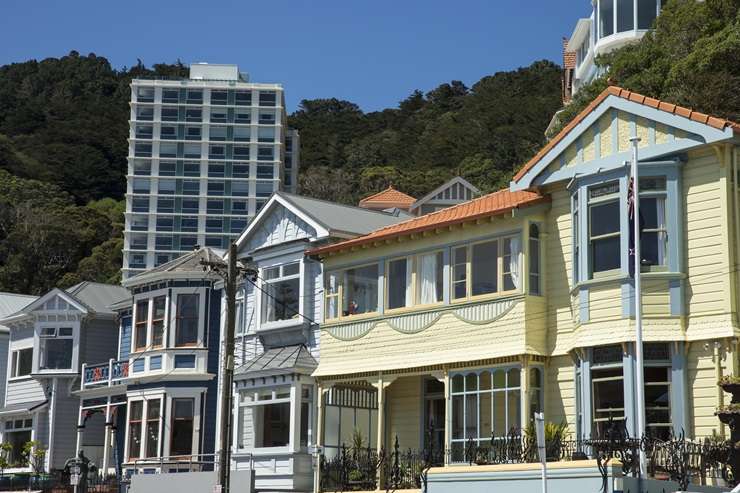The release of Wellington’s new council valuations next month is likely to trigger a wave of objections, real estate agents have told OneRoof.
New research by OneRoof and its data partner Valocity suggests the crop of rateable values (RVs) taken in September this year will be lower than the RVs homeowners received three years ago.
Wellington’s average property value fell 20% between the two valuation dates, while sales data shows homes in the capital have consistently traded for well below their RV this year.
Start your property search
A case in point is a property in Oriental Bay whose RV rose from $3.56 million to $5.4m in 2021, but which sold in March this year for just $4.5m.
OneRoof’s analysis of property values in the capital’s suburbs between the two valuation dates found steep falls in all but one suburb. Glenside’s average property value dropped only 5% between the two dates, from $878,000 to $833,000.
The next smallest drop was in Te Aro, where the average property fell 14%, from $823,000 to $710,000.
The analysis of suburbs with 10 or more settled property sales in the last 12 months found 25 suburbs where the average property value dropped 20% or more. The largest drop was in Pipitea. Its average property value fell 29%, from $839,000 to $599,000.
The biggest drop in dollars was in the city’s most expensive suburb. Oriental Bay’s average property value fell almost $600,000 between the two valuation dates, from $2.72m to $2.12m.
Wayne Shum, senior research analyst with Valocity, expects the new RVs will fall broadly in line with the market, but that does not mean homeowners should expect a lower rates bill.
RVs were purely a mechanism councils used to set a homeowner’s share of the overall rates bill, he said, adding that homeowners should not use them to price their houses either.
James Wilson, operations manager for Quotable Value NZ, which has worked with local authorities on the new valuations, said it was fair to say that the housing market conditions had softened considerably since the last revaluation, with significant downward pressure on sales activity, volumes and value levels.
Discover more:
- Revealed: The hot 100 New Zealand suburbs to watch in 2025
- First townhouse from cancelled Block NZ hits the market
- Home bought for just 50c looking to sell for more than $1m
Like Shum, he warned buyers and sellers not to use RVs to determine market value. “Given the significant shift in market conditions since our last revaluation, buyers and sellers should ideally be using other processes and tools to help inform the current value of their home, including valuation reports from registered valuers, market appraisals, or online real-time value estimates such as those found on QV or OneRoof.”
Wilson said RVs were calculated using a highly complex and detailed process that utilised all the relevant property sales from an area. “A large number of properties will also be physically assessed, particularly those that have been issued building consents in the last three years,” he said.
“The updated rating valuations will then need to be independently audited by the Office of the Valuer General to ensure they meet rigorous quality standards, before they are eventually confirmed and posted to property owners.”

Valocity senior analyst Wayne Shum says homeowners should avoid using RVs as a guide to house prices. Photo / Fiona Goodall
Some agents report that some homeowners in Wellington, already angry about the rise in the cost of living and council spending, would challenge the council if their RV fell but their rates bill didn’t.
Charles Morley-Hall, principal of Just Paterson, thought RVs were likely to fall this time round – but not by much. “While they should be down considerably I suspect they will only be down a few percentage points, which again means they are not reflective of the market value of properties,” he told OneRoof.
“Ultimately, it’s not a measure of the market valuation of a property, it’s just a valuation for councils to tax off.”
When the rateable values were last set they were so high some owners expected to receive more for their property than was realistic, but people soon learned the values were “completely out of kilter” with where the market was.
“Wellington agents have always needed to talk to owners and buyers about the relevance or not of rateable values.”
He did not think any particular suburbs would see bigger falls than others, saying in Wellington houses were very different “not just street by street but neighbour by neighbour”.
“The only time you’ve really can be accurate with comparing one property to another is an identical apartment or an identical townhouse that’s been built in the last 10 years.”
Valuing properties as a real estate agent was a mix of science and art, he said: “How do you value what we used to refer to as $1m view which, of course, now might be a $100,000 view or a $4m view? How do you value good or bad access?”

Oriental Bay is home to some of Wellington’s most expensive houses. The suburb’s average property value has dropped almost $600,000 between September 2021 and September 2024. Photo / Getty Images
Morley-Hall said people should remember they had the option to challenge their RV when it came out, and he thought more people would.
“I think in the past years perhaps only two or three percent of people have challenged their rateable values,” he said.
“I project that will be considerably higher this time around because people will believe that will affect their rates, bring their rates bill down, and, you know, in a cost of living crisis that’s quite a large part of people’s outgoings on a property.”
Grant Henderson, Wellington regional manager for Bayleys, also thought there would be more challenges. “Because, you know, if you’re going to sell your property at $1.2m yet you’re paying rates on something that’s got a $2m rates charge, it’s a bit on the nose, isn’t it?
“I would suggest it’s everybody’s right to push back.”
Tim Clark, sales director for Tommy’s, said the consensus around Wellington was RVs were too high but he could not see them dropping. “I just can’t see why they would because they’re a rating tool and, obviously, Wellington City Council desperately needs money for all sorts of different reasons.
“Our pick is that they will just remain probably about the same. I would be highly, highly surprised if they went up, and there would be a massive uproar – I just can’t see them coming down because essentially that’s just going to reduce the city council’s rating income.”
If they stayed the same or went up, he thought more people would challenge them. “People will go, ‘Well hang on, that RV is outrageous and that’s attached to the rates I’m paying and I’m paying rates on a value on my property that’s not worth it so I want you to come round and value it properly’.”
And Wellingtonians had already seen big rates hikes. Clark said: “My own personal rates were 21.6% up on the family home which is a bit of an outrage and when you look at what our rates are versus what we’re getting back across the city I don’t think anyone’s happy about it.
“Needless to say, it’s going to be really, really interesting to see what happens to them this time around, that’s for sure.”
- Click here to find properties for sale in Wellington


















































































